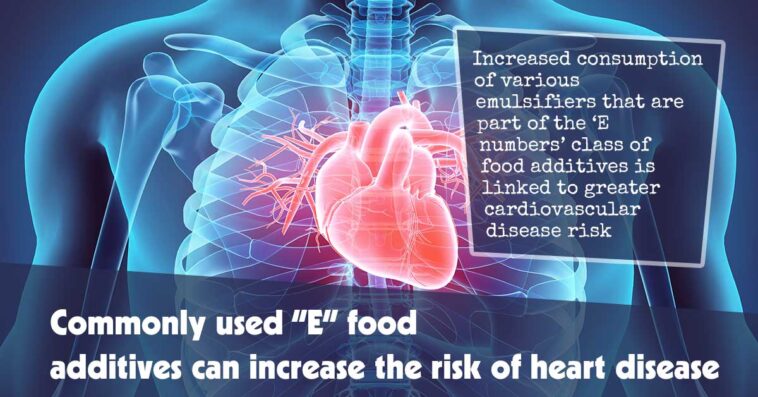Frequently Utilized “E” Food Additives May Heighten the Risk of Heart Disease
Studies have shown that an increase in consumption of various E numbers food additives – commonly used to enhance texture and extend shelf-life – could increase cardiovascular disease risk.
These results have significant ramifications for public health as food additives are found in thousands of processed food products consumed globally.
Emulsifiers are added to packaged and processed foods such as ready meals, margarine, bread, chocolate desserts, ice cream cakes and pastries to improve shelf life, texture, taste and appearance.
Pectins, gums, phosphates, red seaweed-derived carrageenans used for thickening food products, lecithins modified starches mono and diglycerides of fatty acids celluloses are some examples.
As with other food additives, the safety of emulsifiers is regularly evaluated based on available evidence; however, several recent studies suggest that they disrupt gut bacteria and increase inflammation; leading to potential cardiovascular issues and increased susceptibility.
Researchers evaluated how exposure to emulsifiers impacts cardiovascular health risks, such as cerebrovascular and coronary heart diseases that disrupt blood vessels in the brain and heart, and affect circulation.
Their results were drawn from 95,442 individuals aged 43 on average and 79% female who took part in the NutriNet-Sante study without any history of cardiovascular disease.
Individuals were required to submit at least three 24-hour diet records per year online during the initial two years. Each beverage and food item consumed was then matched against three databases at brand level to identify whether any food additives were present and in what quantities. Laboratory tests were also carried out in order to provide quantitative data.
Individuals were required to document any significant cardiovascular disease event, such as stroke or heart attack, which were later confirmed by an expert panel after reviewing medical records.
Deaths associated with cardiovascular disease were documented using the national death register, taking into account various well-known cardiovascular risk factors like age, sex, body mass index (BMI), physical activity levels, smoking status and family history as well as education level and diet quality (e.g. alcohol intake, salt content in diet etc).
After seven years of monitoring, increased consumption of carboxymethylcellulose (E466), cellulose (E460), and total celluloses (E460 to E468) was associated with increased risks for cardiovascular disease – specifically coronary heart disease.
Increased consumption of diglycerides and monoglycerides of fatty acids (E472 and E471) was found to increase risks across all outcomes examined.
Lactic ester of diglycerides and monoglycerides of fatty acids (E472b) was associated with increased cerebrovascular diseases and cardiovascular disease risks; citric acid ester of diglycerides and monoglycerides of fatty acids (E472c) was linked with increased coronary heart disease risk and cardiovascular disease risk.
Increased consumption of trisodium phosphate (E339) was linked with an increased coronary heart disease risk. No evidence was found between any other emulsifiers tested and any cardiovascular conditions.
As this study is only an observational one, its cause can’t be established and some limitations were noted by researchers – such as higher educational backgrounds among participants in comparison with general population, as well as more health-conscious behaviors among them that might compromise results reliability.
However, this was an extensive study sample and many potentially influential factors were adjusted for. Furthermore, brand-specific food additive data was employed. Results remained the same after additional testing.
